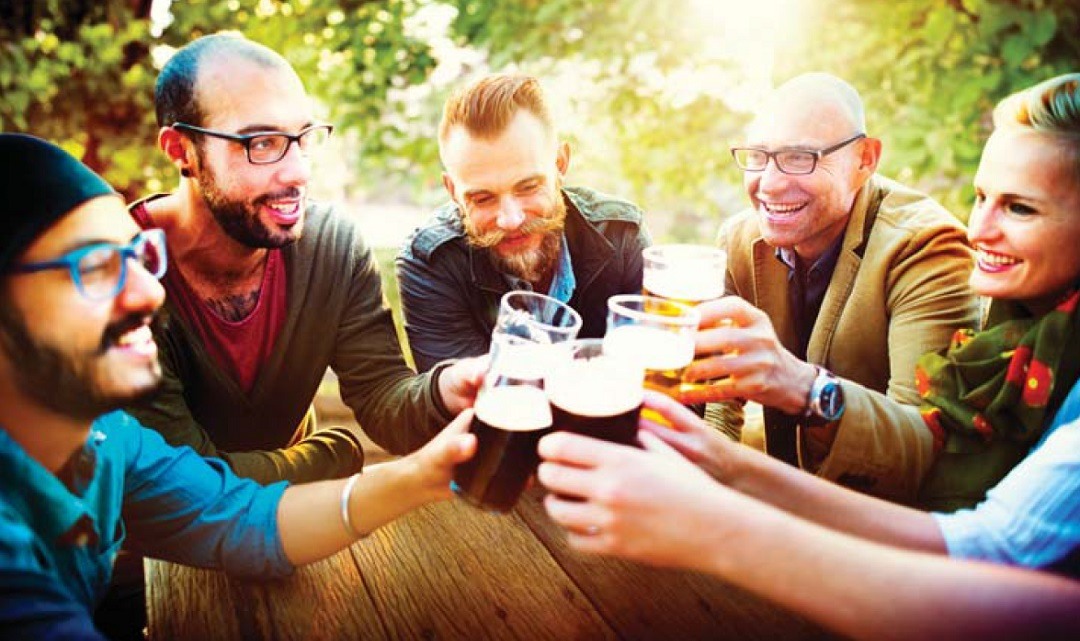This article first appeared in the Viewpoint section of the Christian Research Journal, volume 41, number 1 (2018).
Viewpoint articles address relevant contemporary issues in discernment and apologetics from a particular perspective that is usually not shared by all Christians, with the intended result that Christians’ thinking on that issue will be stimulated and enhanced (whether or not people end up agreeing with the author’s opinion).
For more information about the Christian Research Journal, click here.
A quick Google search using the question, “Should Christians drink alcoholic beverages?” yields some interesting results. For example:
- “There is clear evidence in the Scriptures that believers should not drink alcoholic beverages.”1
- “The Old Testament is unambiguous that wine and other alcoholic beverages are a blessing, and their absence is considered a curse…. It wasn’t until the Protestant social reform movement of the 1800s that temperance was equated with complete abstinence.”2
- “I am not calling on everyone to become teetotalers. But I am asking us to consider temperance as a valid and thoughtful option.”3
- “In recent years, it has become increasingly common — even trendy and vogue — for contemporary evangelicals to imbibe the produce of the vine and extoll the virtues of craft beers and specialty mixed drinks.”4
This is a contentious issue for many followers of Christ. I have no desire to be an apologist for the improper use or abuse of alcohol. Alcohol can be very destructive. For those who have substance-abuse issues or have a valid concern that drinking will cause a particular brother or sister to stumble (see Rom. 14:21), it is wise to avoid alcohol. For those who have no interest, don’t like it, or have other good reasons not to drink, there is no reason to start. For those who are able to enjoy alcoholic beverages as a gift from God, however, they can do so with gratitude.
Alcohol in the Bible. The Bible has both positive and negative things to say about alcohol. The book of Proverbs gives clear warnings about its dangers. Proverbs 20:1 warns, “Wine is a mocker and beer a brawler; whoever is led astray by them is not wise.”5 Later, Proverbs 23:20–21 tells us this: “Do not join with those who drink too much wine or gorge themselves on meat, for drunkards and gluttons become poor, and drowsiness clothes them in rags.”6 Followers of Christ should not get drunk (Eph. 5:18), and we should avoid causing harm (1 Cor. 8). But avoiding drunkenness does not entail abstinence from alcohol, just as avoiding gluttony does not entail abstinence from food.
Other areas of Scripture are more positive about alcohol. Psalm 104:15 praises God for giving “wine that gladdens human hearts.” In John 2, Jesus miraculously turns water into choice wine at a wedding. Paul advises Timothy to take a little wine for his stomach (1 Tim. 5:23). In her excellent book The Spirituality of Wine, Gisela Kreglinger discusses wine in the Bible as a gift and blessing from God.7 She observes that wine is one of the many good gifts of God in creation given for our enjoyment. In addition to the above passages, she points out that wine is included in Isaac’s blessing of Jacob (Gen. 27), brings cheer to human beings (Judges 9:13), and is a sign of God’s redemption (Joel 2; Zech. 8:12). She observes that “Jesus himself seems to have enjoyed wine regularly. He must have done so often enough that his fellow Hebrews became uneasy with it. They accused him of being a drunkard.”8 Of course, it was a false accusation. In the future, Jesus once again will drink of the fruit of the vine with His followers, in the kingdom of His Father (Matt. 26:29). Wine is seen as a good thing in Scripture — a gift and blessing from God.
Of special interest when considering the topic of alcohol in the Bible is Deuteronomy 14:22–26 (emphasis added):
Be sure to set aside a tenth of all that your fields produce each year. Eat the tithe of your grain, new wine, and olive oil, and the
firstborn of your herds and flocks in the presence of the Lord your God at the place he will choose as a dwelling for his Name, so that
you may learn to revere the Lord your God always. But if that place is too distant and you have been blessed by the Lord your God and cannot carry your tithe (because the place where the Lord will choose to put his Name is so far away), then exchange your tithe for silver, and take the silver with you and go to the place the Lord your God will choose. Use the silver to buy whatever you like: cattle, sheep, wine or other fermented drink, or anything you wish. Then you and your household shall eat there in the presence of the Lord your God and rejoice.
It is easy to miss what is being said here. In certain circumstances, the Israelites were to sell their tithe, then use the money to buy “whatever you like” in order to have a feast, to rejoice, and to celebrate in the presence of God. The spiritual discipline of celebration certainly doesn’t require alcohol, but it isn’t prohibited, either. We need to realize that God is passionate about celebration because it is good for the community and good for the soul. Christians, of all people, should be able to enjoy the good things that are a part of life on this planet, including “wine or other fermented drink.” If we do this in the right way, enjoying these and other goods in harmony with wisdom and holiness, then we display our Maker’s mark.
Drinking Virtuously. G. K. Chesterton offers excellent advice on the proper use of alcohol. He says that one should “drink because you are happy, but never because you are miserable.”9 Chesterton’s view is that alcohol is good to use for the purpose of celebration, but not to numb our pain or drown our sorrows. Psalm 104:15 notes that wine “gladdens human hearts,” but I take this to be in the context of celebration, not to dull our pain. And while Proverbs 31:6 discusses wine being used by those in anguish,many interpret this as an ironic statement in the context of the verse. Celebration is a virtuous reason for drinking, but using alcohol to drown our sorrows is not.
Love is the most important consideration as we think through virtue and the use of alcohol. Love for God, others, and ourselves is central. Alcohol can be abused, misused, and valued too highly. Alcohol should not be used to dull the pain that we ought to be taking to God and to those in our community of faith. If we are to display Christian character in our lives, these considerations are essential. Like many other good things, we may choose to abstain from alcohol for the sake of our relationship with God or our love for others and concern for their welfare. But we may also choose to enjoy it, if we are able to do so in ways that are honoring to God and loving toward others.
According to William Mattison, in his book Introducing Moral Theology: True Happiness and the Virtues, alcohol has several virtuous uses.10 Mattison offers an excellent framework for thinking through our use of alcohol as Christians.
First, we should ask ourselves, Why do I drink? Drinking in order to facilitate social interaction, to foster celebration and cheer, and to relax and unwind suggest themselves as examples of virtuous reasons for drinking. These are good reasons to drink. We shouldn’t drink to escape reality, dull our pain, to impress or garner the approval of others, or to lose our inhibitions. If alcohol is necessary for us to have a good time, to relax, or to be honest with others, then something has gone wrong. Perhaps a flaw in our character is being revealed. We need to be able to do such things without the “help” of alcohol.
A second question to ask, as we consider virtuous drinking, is, Are the reasons I say I have for drinking my actual reasons? If we say we drink in order to relax, but in reality our drinking makes us feel tired or sick the next day, then our stated reasons for drinking may not be our actual reasons. Or if we say we drink to facilitate enjoying the company of friends, but our use of alcohol ends up sowing discord and conflict, then we need to re-evaluate what is really going on and make the appropriate changes.
The third question to ask is, What sort of person am I becoming, given the ways I use alcohol? Habits are the heart of human life. What sort of habits are we cultivating by our use of alcohol? Wisdom is required as we search our own hearts. One person’s limit may be two drinks, while another may only be able to handle less. Mattison rightly says that alcohol should be “a decorative garnish to the feast of life, rather than a, or the, central component of the meal.”11 If it is more than this for us, then we should think about what needs to be changed so that alcohol has its proper place in our lives.
There have been periods in my life when I’ve completely abstained from alcohol. At other times, I’ve enjoyed a good drink. Perhaps the best words to close with are from Paul, who offers us sound guidance in Colossians 3:17: “And whatever you do, whether in word or deed, do it all in the name of the Lord Jesus, giving thanks to God the Father through him.” —Michael W. Austin
Michael W. Austin is professor of philosophy at Eastern Kentucky University. His latest book is Humility and Human Flourishing (Oxford University Press, 2018). He blogs at his website, www.michaelwaustin.com, and at Psychology Today (www.psychologytoday.com/blog/ethics-everyone).
- David Brown, “Seven Reasons Christians Should Not Drink,” Logos Resource Pages, http://www.logosresourcepages.org/Believers/drinking.htm.
- Kevin P. Emmert, “Why So Many Christians Are Relaxing over Drinks,” Christianity Today, https://www.christianitytoday.com/ct/2013/december/why-so-many-christians-arerelaxing- over-drinks.html.
- D. L. Mayfield, “Why I Gave Up Alcohol,” Christianity Today, https://www. christianitytoday.com/ct/2014/june/why-i-gave-up-alcohol.html.
- Lewis Winkler, “Why I Don’t Drink,” Lewinkler (blog), December 29, 2015, https://lewinkler.com/2015/12/29/why-i-dont-drink/.
- All Scripture quotations are NIV.
- See also Proverbs 21:17; 23:29–35; 31:4–6.
- Gisela H. Kreglinger, The Spirituality of Wine (Grand Rapids: Eerdmans, 2016).
- Kreglinger, The Spirituality of Wine, 31. See Matthew 11:19 and Luke 7:34.
- G. K. Chesterton, Heretics (New York: John Lane Company, 1905), available online at Christian Classics Ethereal Library, https://www.ccel.org/ccel/chesterton/heretics.vii.html.
- William J. Mattison, Introducing Moral Theology: True Happiness and the Virtues (Grand Rapids: Brazos Press, 2008).
- Mattison, Introducing Moral Theology, 125.









